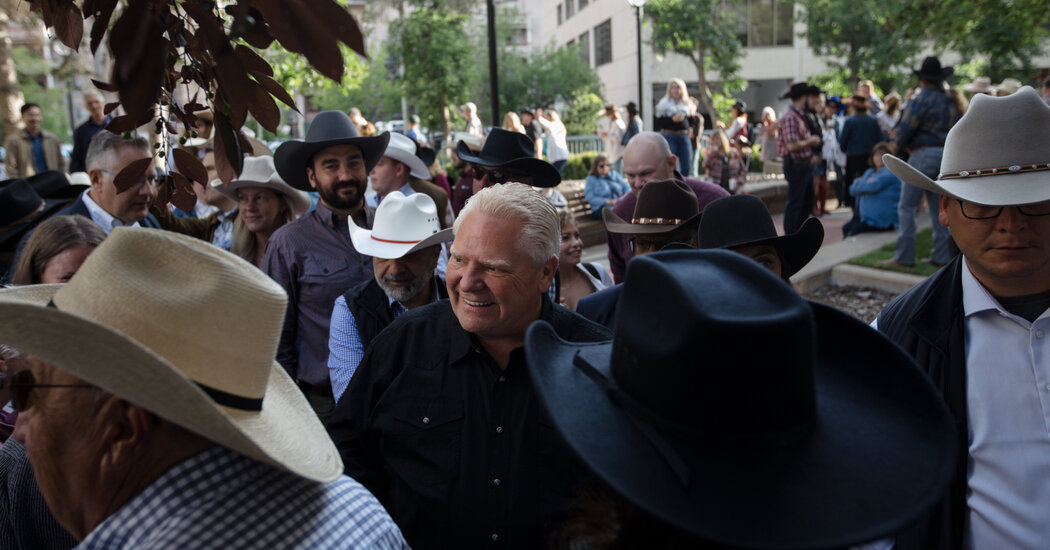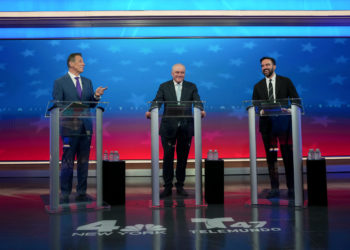Captain Canada is back.
Premier Doug Ford of Ontario, a conservative populist conservative who has earned the moniker for headline-grabbing moves that get under President Trump’s skin, pulled off another dramatic moment with an anti-tariff ad that used 1987 audio of Ronald Reagan decrying tariffs as destructive.
Mr. Trump, in a late-night social media post Thursday, claimed the ad, which was paid for by the province of Ontario and has been broadcast since last week in the United States, was “fraudulent” and announced he was “terminating” trade talks with Canada.
The audio used in the ad was authentic and minor edits to the five-minute original Reagan radio address to fit the one-minute Ontario commercial did not alter the substance: Mr. Reagan vehemently opposed tariffs. The ad faithfully reproduced quotes from the address, in which Mr. Reagan was highly critical of the economic effect of tariffs. It just placed them in a different order.
In the address, Mr. Reagan argues that tariffs “hurt every American worker and consumer” over the long run, make companies less competitive, and trigger trade wars that cost Americans jobs.
On Friday morning, undeterred by Mr. Trump’s wrath, Mr. Ford doubled down: he posted the entire Reagan address, seemingly to push back against any claims that the ad had been fraudulent.
In his post Mr. Ford said, “Canada and the United States are friends, neighbors and allies. President Ronald Reagan knew that we are stronger together.” His office did not respond to requests for further comment.
Prime Minister Mark Carney of Canada, who is a button-downed former banker and the Liberal Party leader, enjoys a good relationship with the very different Mr. Ford, but has not commented directly about Mr. Trump’s eruption.
Mr. Carney on Friday said that American and Canadian officials had been in “detailed, constructive” talks over tariffs on steel, aluminum and energy.
“We stand ready to pick up on those discussions when the Americans are ready,” he added, and repeated a line he uses often when U.S. talks hit a snag: “For months we have stressed the importance of distinguishing things we can control and things we can’t control. We can’t control the trade policy of the United States.”
Mr. Carney made the comments on the tarmac in Ottawa as he prepared to take off for Asia where he will attend the Association of Southeast Asian Nations summit in Kuala Lumpur. Mr. Trump is also expected to attend.
The United States has a relatively low average rate of tariffs on Canadian goods, because the levies are not applied to goods covered by the U.S.-Mexico-Canada free trade agreement. But it has applied harsh tariffs on goods critical to the Canadian economy that are not covered by the trade agreement: autos, steel, aluminum and lumber.
The episode over an ad taken out to influence Americans against the U.S. tariffs on Canadian goods — using a former Republican president’s words — was vintage Mr. Ford.
In presenting the ad campaign at an event on Oct. 16, Mr. Ford said he’d heard the Reagan anti-tariff comments and thought: “Let’s take Ronald Reagan’s words and let’s blast it to the American people.”
It’s not the first time Mr. Ford has irritated Mr. Trump. In the past he piqued the president’s ire after suggesting that Ontario should cut its electricity exports to New England (which are significant) as a means of pressuring the administration to remove tariffs.
He ran another ad campaign this year in the United States, albeit a gentler one, using Fox as a platform to highlight to Republican voters just how deep the links between Ontario and the United States run.
And when Mr. Trump started repeating that he wanted to annex Canada and make it the 51st state in late 2024 and early 2025, Mr. Ford was the first major figure in Canadian politics to sport a “Canada is not for sale” cap.
One of his first moves to retaliate against U.S. tariffs was to remove American liquor from the shelves of shops operated by the Liquor Control Board of Ontario, the government-controlled distribution monopoly, which is one of the biggest buyers of American alcohol in the world.
Mr. Ford, who in a hot-mic moment earlier this year admitted he had been a Trump supporter before the trade breakdown, has a lot at stake in the protracted standoff between the United States and Canada.
His province, the country’s most populous and its economic powerhouse, is home to both the capital of Ottawa and the financial center of Toronto, and is deeply integrated into the U.S. economy. The tariffs are hitting several major economic sectors in Ontario and Mr. Trump’s tariff policies and pressure to move auto production to the United States have cost Ontarians thousands of jobs.
Ontario’s automobile industry has suffered two major blows this month linked to Mr. Trump’s trade policies.
Stellantis, the giant automaker, announced that it would move production of a new Jeep model from an idle factory in the Toronto suburb of Brampton to a plant in Illinois. The company shut down the factory in 2023 and laid off its roughly 3,000 workers so that it could retool the facilities, but now the fate of those employees is unclear.
And on Tuesday General Motors said it was ending production of its electric van in Ontario, a move that will mean the loss of about 1,200 jobs.
Ian Austen contributed reporting from Ottawa, and Ana Swanson from Washington.
Matina Stevis-Gridneff is the Canada bureau chief for The Times, leading coverage of the country.
The post New Trump-Canada Spat Spotlights ‘Captain Canada,’ the Ontario Premier appeared first on New York Times.




